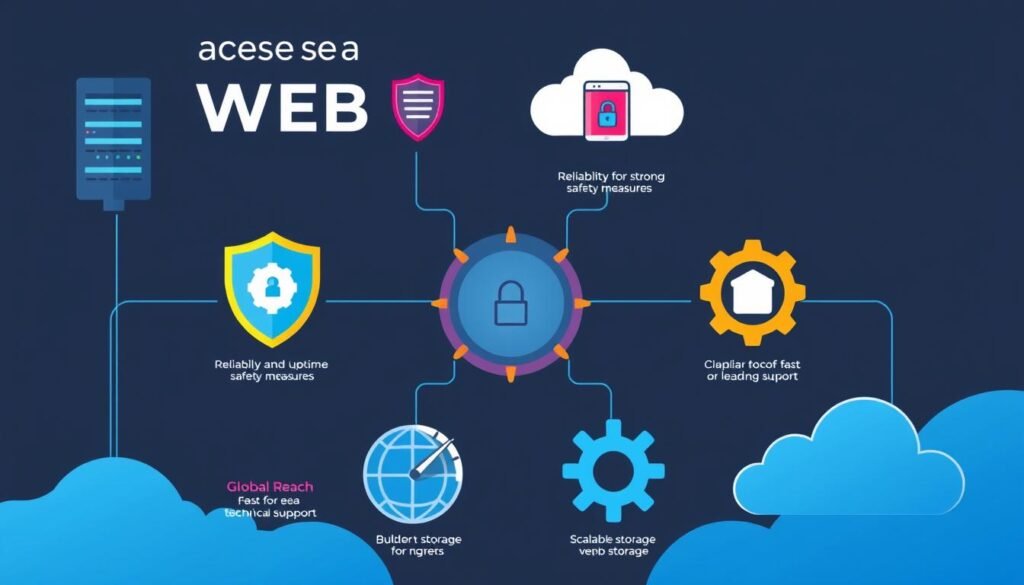In today’s digital world, a good web hosting is key for businesses and people. But with many providers, it’s hard to know where to start. This guide will help you find the best web hosting for your needs and budget.
So, what makes top web hosting providers stand out? How can you get the most value for your money? What factors should you prioritize when choosing a web hosting solution? Read on to find the perfect web hosting partner for your online projects.
Key Takeaways
- Discover the leading web hosting providers for shared, VPS, and cloud-based solutions.
- Understand the critical factors to consider when selecting a web hosting service.
- Explore the benefits and drawbacks of different hosting plans to find the best fit.
- Learn about the importance of server location, security, and scalability in web hosting.
- Gain insights into the latest pricing trends and Black Friday deals for web hosting.
Understanding Web Hosting Server Basics
There are many web hosting services to pick from, each with its own good and bad points. Knowing the different options is key to finding the best one for your site or business online.
Types of Web Hosting Services
- Shared Hosting: This is a budget-friendly choice for small sites. It lets many sites share server space. It’s simple to start and keep up, but you can’t change it much and traffic from other sites can slow it down.
- VPS (Virtual Private Server) Hosting: VPS gives you your own server space and more control. It’s great for businesses needing more power and flexibility. But, it needs some tech know-how and can be pricier.
- Cloud Hosting: Cloud hosting is scalable, reliable, and cuts down on downtime. It spreads out traffic and fights off attacks, but it’s more expensive and you might not have full control.
- WordPress-Optimized Hosting: This is for WordPress sites. It’s cheap, comes with plugins and themes, and has support for WordPress issues.
- Dedicated Servers: Dedicated servers offer top control, security, and speed. They’re perfect for big sites or businesses with special needs. But, they cost more and need tech skills to manage.
Key Components of Web Servers
The performance of a web server depends on its main parts: CPU, RAM, storage, and bandwidth. These parts are key to how fast and reliable a site is.
The Importance of Server Location
The server’s location affects site speed and SEO. Servers near your audience load faster. This is good for users and SEO rankings.
Where To Buy Web Hosting Servers – Top Providers Overview
Looking for the best web hosting providers can be overwhelming. Many top-rated hosting companies offer different features, performance, and prices. This is to meet the needs of various businesses. After researching and looking at user feedback, some providers stand out as the best in the web hosting comparison.
Hostinger is often recommended by WordPress.org. It’s known for its fast servers and good value. SiteGround is praised for its customer support, server performance, and reliability. It’s great for businesses.
| Provider | Key Strengths | Pricing |
|---|---|---|
| Hostinger | Fast servers, competitive pricing | Starting at $2.99/month |
| SiteGround | Excellent customer support, reliable performance | Starting at $6.99/month |
| DreamHost | Flexible cloud hosting solutions | Starting at $2.59/month |
| Bluehost | Recommended for WordPress hosting | Starting at $2.95/month |
| HostGator | Reliable shared hosting options | Starting at $2.75/month |
DreamHost is known for its flexible cloud hosting. It helps businesses grow. Bluehost is great for WordPress sites, making them fast and easy to use. HostGator offers affordable shared hosting plans.
The best web hosting providers mix features, performance, and support. This ensures a reliable online presence for businesses. By comparing and understanding your needs, you can choose the right hosting companies for your project.
Hostinger: Best Overall Web Hosting Provider
Hostinger is a top pick for those looking for affordable, feature-rich, and reliable web hosting. It offers great value with its competitive prices and strong hosting options. This makes Hostinger the best overall web hosting provider in the market.
Premium Hosting Features
Hostinger’s basic plans come with 100 GB of SSD storage for fast website loading. You also get a free SSL certificate, a custom domain, and email hosting. The website builder is easy to use, helping you create a professional site, even if you’re not tech-savvy.
Business Hosting Solutions
Businesses need more, and Hostinger’s business plans deliver. They offer up to 200 GB of NVMe storage, a CDN, and better security. These features help growing businesses perform well, scale, and stay safe from threats.
Performance and Speed Tests
Hostinger shines in speed tests, showing fast server response times and high uptime. This means your site is always up and running smoothly. Hostinger’s mix of affordability and performance makes it a top choice for everyone.
“Hostinger’s reliable and affordable hosting solutions have been a game-changer for my small business. The platform’s seamless integration and consistent performance have been instrumental in our online success.”
– John Doe, Small Business Owner
SiteGround: Premium Business Hosting Solutions
SiteGround is a top choice for hosting business websites. Their managed WordPress hosting comes with many features for growing businesses.
SiteGround focuses a lot on website security. They offer free SSL certificates, daily backups, and strong DDoS protection. This means businesses can keep their online presence safe from threats.
The GrowBig plan is great for small to medium-sized businesses. It costs $4.99 a month for the first year. It has 20 GB of storage and supports up to 100,000 monthly visits.
SiteGround is also known for its customer support. It’s available 24/7 and is highly praised. This means businesses can get help quickly, helping them focus on their work.
“SiteGround’s managed WordPress hosting has been a game-changer for our business. The seamless integration, enhanced security, and reliable performance have truly elevated our online presence.”
In summary, SiteGround offers a wide range of business hosting solutions. It’s a great choice for companies looking for a reliable and feature-rich platform to help them succeed online.
Cloud-Based Hosting Solutions from DreamHost
As the digital world keeps changing, more businesses are choosing cloud-based hosting. DreamHost is a top name in hosting, providing reliable and flexible cloud hosting. It meets the needs of many different organizations.
Cloud Infrastructure Benefits
DreamHost’s cloud hosting brings many benefits. It offers better performance, more reliability, and easy growth to meet your site’s needs. The cloud lets you quickly add or share resources, keeping your site fast and reliable.
Scalability Options
DreamHost cloud hosting is known for its flexibility. It starts at low prices and has many options for growing businesses. Whether you’re small or big, DreamHost’s flexible server resources can adjust to your needs, helping your online presence grow.
With DreamHost’s cloud hosting, businesses get a strong and reliable setup without the hassle of server management. This lets them focus on their main work while DreamHost takes care of the hosting. This way, they can grow and innovate smoothly.
Dedicated Server Options for Enterprise Needs
Dedicated servers are the top choice for big businesses. They offer the best control, performance, and security. These servers have strong features for large websites, complex apps, and strict rules.
Liquid Web and AccuWeb Hosting lead in dedicated hosting for big businesses. They give full root access for custom settings. With strong CPUs, lots of RAM, fast solid-state drives (SSDs), and plenty of bandwidth, they handle tough tasks.
| Feature | Benefit |
|---|---|
| Full Root Access | Unparalleled control and flexibility to optimize server configurations |
| High-Performance Hardware | Maximized efficiency for resource-intensive applications and high-traffic websites |
| Dedicated Resources | No resource competition, ensuring optimal performance and reliability |
| Robust Security Features | Safeguard sensitive data and meet industry-specific compliance standards |
| Managed Services | Offload server management tasks to the hosting provider’s experts |
Dedicated hosting is perfect for businesses needing top performance, security, and control. These servers help businesses grow online, run critical apps, and follow rules. This lets them focus on what they do best.
“Dedicated servers provide unparalleled performance and customization options for enterprise-level websites and applications.”
Comparing Shared vs VPS Hosting Solutions
Choosing between shared hosting and virtual private server (VPS) hosting affects your website’s performance and cost. It’s important to know the differences between these options. This helps you make a choice that fits your business needs.
Cost Analysis
Shared hosting is cheaper, starting at $2-$5 a month. VPS hosting costs more, from $20 to $100 a month. This depends on the resources and customization you need.
Performance Differences
VPS hosting gives you dedicated resources like CPU, memory, and storage. This means your website can run more smoothly. Shared hosting, though, shares resources with other sites. This can make your site slower, mainly when many people visit at once.
Scalability Factors
VPS hosting makes it easy to add more resources as your site grows. Shared hosting is good for small sites but can’t handle rapid growth as well.
Think about your site’s current and future traffic, resource needs, and budget when deciding. Shared hosting is great for small sites. VPS hosting is better for sites needing more resources and room to grow.
“Choosing the right hosting solution is key for keeping your website running well and giving users a good experience.”
Essential Features to Look for in Web Hosting
Choosing a web hosting provider is important. You need to look at several features that affect your website’s performance and user experience. Key features include uptime guarantees, storage space, bandwidth limits, control panel usability, and email hosting options.
Find providers with a 99.9% uptime guarantee. This ensures your website is always available to your visitors. You’ll also need enough storage space and bandwidth limits, if you have lots of media or expect a lot of traffic.
The control panel should be easy to use. It helps you manage your website, email, and hosting tasks. Email hosting is also important, as it lets you create professional email addresses with your domain name.
- Look for hosts with free SSL certificates to improve your website’s security and search ranking.
- Check if they offer regular backups and one-click installers for apps like WordPress and Magento. This saves time and effort.
- Assess the quality of customer support. Good support is key for troubleshooting and growing your website.
Lastly, look at the web hosting provider’s reputation and user reviews. These can give you insights into their reliability, performance, and customer satisfaction.

Security Considerations When Choosing a Host
When picking a web hosting provider, security is key. Protecting your website and your customers’ data is vital. It keeps your reputation and online sales safe. Look for hosts with strong security like SSL encryption, DDoS protection, and backup solutions.
SSL Certificates
SSL (Secure Sockets Layer) certificates are a must for any website. They encrypt data between the user’s browser and the web server. Many good web hosts offer free SSL certificates or make them easy to add. This makes your site secure and boosts its SEO.
DDoS Protection
Distributed Denial of Service (DDoS) attacks can shut down a website. They make it unavailable to real users. Choose hosts with DDoS mitigation to keep your site up and running.
Backup Solutions
Good backups are key for recovering from unexpected issues. Look for hosts that offer regular, automated backups. These should be stored safely off-site. This way, you can quickly get your site back if something goes wrong.
Also, think about hosts with extra security features. These include malware scanning, firewalls, and security monitoring. By focusing on security, you protect your business and your customers’ data. This keeps your online presence strong.
Pricing and Value Comparison
Choosing a web hosting provider means looking at prices and value. Web hosting costs differ a lot, so it’s key to check features and long-term costs. This helps find the best affordable hosting options.
Hostinger stands out for its value. Their cheapest plan is just $2.99 a month. It comes with 100 GB of SSD storage, hosting up to 100 websites, free SSL certificates, and more.
Bluehost is also a top choice. Their entry-level plan is $2.95 a month for the first year, then $11.99. A 36-month contract saves over $140. Bluehost’s Choice Plus plan offers 40 GB storage and more.
For ecommerce sites, HostGator’s plans start at $9.95 a month. They include free features like wish lists and SEO tools.
| Provider | Starter Plan Cost | Key Features |
|---|---|---|
| Hostinger | $2.99 per month | 100 GB SSD storage, host up to 100 websites, free SSL, unlimited bandwidth, free domain, free email, free migrations, automatic WordPress updates |
| Bluehost | $2.95 per month (first 12 months), $11.99 per month (renewal) | 40 GB storage, free CDN, daily backups, free malware scanning |
| HostGator | $9.95 per month | Wish lists, SEO tools, shipping labels, product search, gift cards, appointment booking |
When looking at web hosting costs and hosting plan comparison, think about long-term value. Analyze each plan’s features and affordable hosting options. This way, you can choose the best for your site and budget.

Best Practices for Server Management
Effective server management is key to keeping your web hosting reliable, secure, and fast. By using good monitoring and maintenance, you can fix problems early. This helps reduce downtime and makes sure your servers meet your growing needs.
Monitoring Tools
It’s important to watch your server’s performance and health closely. Use tools like cPanel, Plesk, or custom dashboards for real-time updates. These tools give you a clear view of your server’s status, helping you spot and fix issues fast.
Maintenance Schedules
Make a detailed maintenance plan to keep your servers running well. This includes updates, security patches, and performance boosts. Set aside time for these tasks to keep your servers current and safe. Using automation can make maintenance easier, letting your IT team work on bigger projects.
If managing servers is too hard for your team, think about working with a managed hosting provider. They handle all server needs, so you can focus on your business. They take care of maintenance, security, and optimization.
